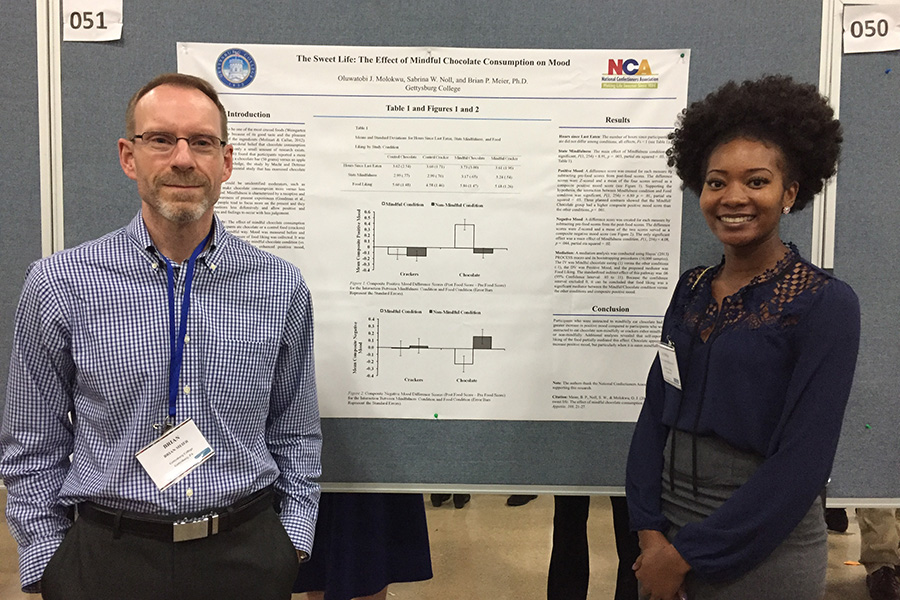
As we engage in our daily activities, we may not always be mindfully aware of where we are, what we’re doing, and even what we eat at any moment. For Gettysburg College Psychology Prof. Brian Meier, mindfulness, the human ability to be fully aware and present, has been a focus of his scholarly studies over the past decade in collaboration with several Gettysburg College students.
Meier’s recent work, a study published in August 2023 in the journal Food Quality and Preference, was co-authored by Allison Romano ’20, Samantha Kateman ’23, and Rachel Nori ’23. This student-faculty research on mindful candy eating found that people can get more enjoyment from smaller portions of candy if they fully engage their senses when consuming it. Research from Meier’s team suggests that eating candy mindfully might help reduce portion size and calorie intake.
“The opportunity I had to be Prof. Meier’s research assistant and partake in the publication of the ‘Less Is More’ study about mindful eating was one of the most valuable pieces of my undergraduate career,” said Nori, who will begin an Entry-Level Doctor of Occupational Therapy (ELOTD) graduate program at Chatham University this fall. “Working in the lab, I got to understand social psychological research in an in-depth, practical way. This has helped me immensely not only in expanding my base of knowledge and comprehension but also in my graduate school pursuits.”

This 2023 study on mindful candy eating complements Meier’s work on mindfulness, which includes an earlier study he conducted with Sabrina Waage Noll ’14 and Oluwatobi (Justina) Molokwu ’17. Their 2017 research, published in the journal Appetite, studied the effect of mindful chocolate consumption on people’s moods and found that mindful chocolate eating increased positive affect.
“I truly appreciated the opportunity to participate in this research with Prof. Brian Meier, who was also my faculty advisor. Being brought into the study development process and learning from a faculty member with so many years of experience was, looking back, pivotal to my college career,” said Molokwu, a lead technologist for Booz Allen Hamilton. “I was able to gain hands-on experience conducting the types of studies I was referencing in my research papers, and being a part of a study that was later published is not something I was expecting from my Gettysburg experience.”
Meier said that the research process gives students opportunities to learn about careers in their major and helps them understand the parts of the research process.
“Research students learn about the scientific method, including how to produce a research idea, collect data, analyze data, and write up and present the results. Students often work closely with faculty members and other students. They learn how to work as a team and about attempting to contribute new knowledge to a research area,” he said. “I hope that the experiences they have help them understand and appreciate the value of hard work, attention to detail, and starting and finishing projects. I depend upon students for my research.”
By Michael Vyskocil
Photos by Hang Lian and courtesy of Psychology Prof. Brian Meier
Posted: 02/06/24